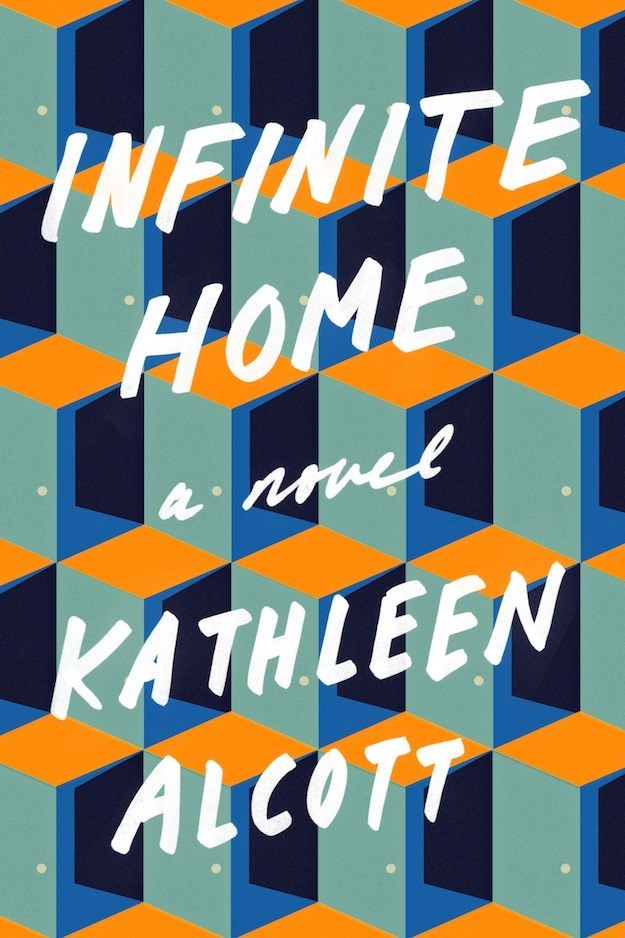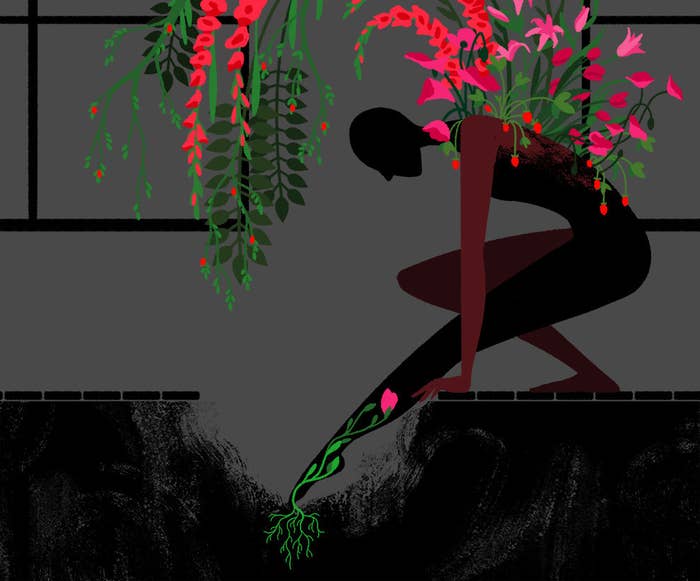
Several years before we met, my boyfriend bought a shell of a building on a shady street in Brooklyn; after our first months glued to each other, he took me on a tour of the gutted brownstone, which was then several floors of skeletal plywood and no plumbing. We had decided to move in together once the renovation was complete. "Aren't you excited?" He asked. I had been too quiet throughout the tour, had not exclaimed at the possibilities of certain rooms or at the way the light came in. "I am," I said. And then: "I've never had stairs before." The admission put a wobble in my voice. As a child, I had written characters and dialogue for my sneakers and Mary Janes, the soles of which had come loose and begun to "talk." I remember the fraught negotiations in Payless Shoe Source and Ross Dress for Less, the plastic-framed Matisse print that was more sun-bleached every year, the intersections where our huffing 15 year old cars broke down.
When people learn that my new novel concerns a group of hapless renters who are disturbed and displaced by their landlord's dementia, they typically ask one question: Did that happen to you? The answer is no, but the book in question is undoubtedly a result of the years I spent in run-down apartments in California and New York, my life lived precariously against so many others. It goes back further, even, to a childhood spent in a string of rented houses, to a sense given to me early on that the physical address was something to be shed again and again, that our identities were carried in how we thought and spoke and never in the hastily taped cardboard boxes, which were never packed very carefully.
As the child of a single mother and a father who was something of a hologram the first 10 years of my life, I witnessed the rituals of renting with a spirit of adventure. I watched her paint when we moved in and repaint when we moved out, reinvent rooms in the creative ways that only penny-pinched renters can. For years we shared a large bedroom bifurcated by a Japanese screen onto which she had pasted tissue paper scraps of every color, and the effect of this on the light was a source of fascination and comfort as I woke and prepared for grade school. I was awed but not troubled by the checks she made out to landlords, those spectral figures who somehow had more right to our homes than we did. I accepted the trades inherent in each move: a seedier part of town for a real backyard, a smaller space for the charm of Victorian details. When my father, during a very bad spell, lived in a van until it was repossessed, and then in the loft of a rotting, long-abandoned barn, I thought him a great explorer; I remember the plank one had to cross to get to his mattress, the orange casserole dish that he pissed in, the light that poured in through the many rifts in the wood. At my mother's house, we often had roommates: an uncle who cooked elaborate goulashes and died slowly of AIDS in the drafty back room; a young woman with a string of bodybuilder boyfriends all named Jared; an Austrian friend of my mother's who took eccentric workshops and kept the mysterious, life-size porcelain figurine of a belly dancer she had crafted in the shared living room. I did not understand, until I was much older, that with the exception of her brother, these were compromises my mother had made, not proof of preference. I had assumed our home was filled with people because my mother liked to stay up smoking cigarettes and gossiping, because space was meant to be filled with the noise and clutter of all kinds of people. The guest rooms I occasionally saw at the houses of friends were as foreign to me as photos of life halfway around the world.
In the first year my boyfriend and I lived in our well-appointed home, I was also grieving my mother, who had lasted less than two months after the diagnosis of pancreatic cancer. If this was a strange time to learn how to throw dinner parties, to squabble with flea market vendors about the provenance of 50-year-old lamps, it didn't occur to me then. I perfected my risotto and my roux, placed sprigs of rosemary in the slices of lemon that graced the water pitcher, schooled myself on the many ways one could fold a dinner napkin. Finding myself embedded in a different class than the one in which I'd been raised sometimes felt like a cheat that would soon be exposed. The panic attacks I managed in the bathroom during dinner parties, listening to the forks of friends move across the elaborate meals I'd prepared, did not correlate with the relief and awe I felt, most days, to come home to a place where I felt permanent.
I had lived my life before in accordance with the poverty and itinerancy of my childhood, sliding in and out of other people's leases, never expecting to stay very long and tolerating circumstances that strike me now as completely absurd. In college, I put on a black wig when my reprobate, pill-addled landlord came around and tried to collect rent I'd already paid, because it confused her enough that she would move on to the next tenant to make her false claims of nonpayment and whisper, in her thick, Iranian accent, "Evict, evict!" In San Francisco, I lived with a sex worker who claimed, in a bodiless voice, to be a nursing student — I never once saw a pair of scrubs or a textbook — and who had booming visits with clients on a regular basis. Sometimes my roommate Brandon and I would scurry to the other's room when this happened, so that we could gag and giggle and overhear the finale together. It was also in that house I was once locked into my room, and, learning the slumlord could not be bothered, had to find someone with a toolbox to come to my back-alley window. At another point I answered the roommate-wanted Craigslist ad of a woman nicknamed Steen, whose MySpace alias was "Suck It Steen" and who brought literal definition to that old idiom bringing home the bar. After one night of little sleep, listening to the many visitors crowing some hip-hop refrain about swallowing, I woke early in the morning to make a shift at a job I despised. Sitting on the toilet, I heard the sound no one ever wants to hear while in the bathroom: someone else, very close. A tattooed hand moved the tacky glass sliding door of the shower open; its owner, fetal and dreadlocked, saw me and groaned as though I were his mother confiscating his weed. I remember telling these stories to friends, but I don't remember ever protesting that these situations were impossible. It seemed only natural that my own life should be layered so closely on top of others.
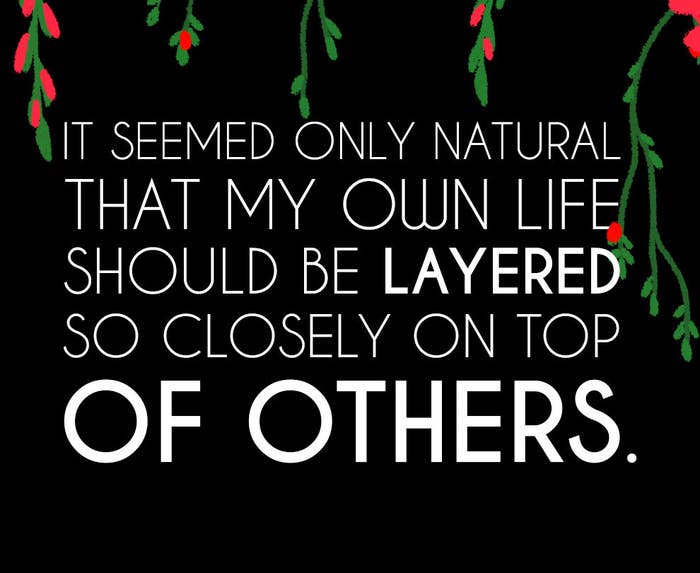
At this time in my life I was very poor but didn't notice: perhaps because I could buy five avocados for a dollar from the smiling vendors on Mission Street, perhaps because the culture of San Francisco then was not to get ahead but to get content, perhaps because my childhood had prepared me for it. It didn't feel strange to live that way in that city, but it started to in New York, where I moved in the middle of the winter. I disposed of or gave away things I loved — a velvet clamshell chair with a gold-green fringe, records, a crooked dresser acquired by my great-grandfather after he arrived from Ireland in 1908 — without fanfare, as though they would come back to me later, meet me waving at some bus stop. I'd chased dangerous fun and its consequences in that city, opium tea on rooftops and burns on my feet from illegal fireworks and abortions I couldn't afford psychically or otherwise, and I must have felt that version of myself did not call for an ounce of preservation.
It felt different to live so scantily on the East Coast, to own very few things, to not feel a sense of home about the place I retreated to from blizzards and hurricanes. It did not seem safe to walk miles in a swarming wall of white, my shoulders clenched forward while the smug skiers whirred past, only to collapse in a bedroom that did little to remind me of myself. I remember subletting, from a lapsed poet-cum-bartender, a well-loved studio under the JMZ lines, tending to her jungle of houseplants. I watered the mess of green curls diligently and tried to imagine how I might become a person like this, who took pride in her small place in the world, who nurtured transformation in a modest row of clay pots. I couldn't. By then I was awaiting my first novel's publication and I began to acquire again, haphazardly, a collection of objects that no one would recognize as an attempt to build a home. I did not buy a set of hand and bath towels or a good chopping knife or cotton pajamas. I bought a Mork from Ork pull-string doll, a pair of damaged library ladders I used as bookshelves, 1940s fringed seafoam bathing culottes that buttoned up the back. My last housing arrangement included a largely unemployed actor who would not allow others' things in the kitchen cabinet and who spent hours on the couch playing first-person shooter games, his head never turning at anyone coming or going. Those sounds began to follow me out of the house, his low murmur into the headset and the carefully reproduced stutters and blasts of machine guns and bazookas. I could not foresee living in this way much longer and yet I could not imagine the alternative.
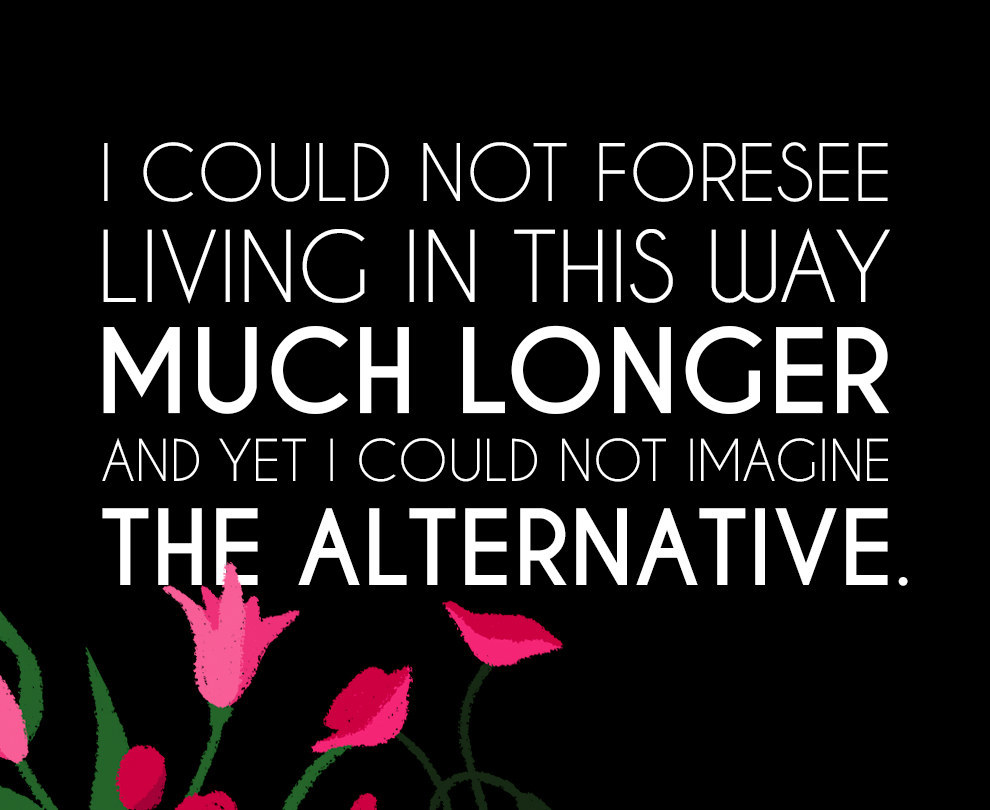
It must have been my mother — a Buddhist, a tenant, never an owner — who taught me to not to fill a room with my identity, to carry my identity from room to room. I feel a little like a spy on the block where I live now, where I've heard the term "renter" used as a pejorative, where the lambent windows display thousands of dollars well-spent. I'm frightened by the comfort I feel in my home office: the hexagonal bookshelves I bought to store my research texts; the photo of my grandfather, a newspaper editor, which my boyfriend rescued and framed with UV protective glass. He knows I lack these instincts or don't follow them enough, that I believe on some level that this home too is temporary. I wonder at the articles of our shared life, things as small as the thrift store water glasses in deep mauves and blues we both happened to find beautiful, the mismatched mirrors we decided would best reflect us for the foreseeable future, and hung side-by-side in our bathroom.
I was young when I met the man I love, 23 and too thin, and I don't feel that way anymore. It's not that old is what I feel but rather tied only to this version of my life, free of any history, because my mother kept very little of her past or mine, no childhood drawings or report cards or quickly outgrown shoes. This didn't strike me as odd until she was gone, perhaps because she was gifted in the art of distraction: Her voice was always inappropriately loud, and she kissed only on the mouth, and she had a way of sprawling out anywhere and purring, "It feels good to be the queen." She didn't deem anything precious enough to protect except her people, so I left California after she'd died at 59 with only a cheap barrette of hers in my pocket and a turquoise ring that had been stuck on her finger for decades. She didn't love the ring, just couldn't be bothered to get it removed, so it couldn't become the talisman for which I'd hoped. The plastic barrette broke twice under the thickness of all my hair, and my boyfriend painstakingly repaired it twice, but the third time it sprung open into all its parts I didn't tell him. I don't know where it is now. I do have a few photographs — in albums that my father put together before his death, 11 years ago — but it doesn't seem right to go to them alone, to pose questions about a camping trip in the mountains or some small-town parade that will never be answered.
"I'm about to make the transfer," I heard my mother explain cheerily to a friend on the phone, cutting him off midsentence, a few days before she was gone. In her last days, she was bored by the photos of our past I brought to show her. Her eyes briefly changed when we showed her a Super 8 recording of her childhood, one memento that had miraculously survived her many moves, but then she waved goodbye to her little-girl self descending a stoop in San Francisco, her dress fattened by the wind, and turned over to nap.
In the absence of a familial home where the deceased person's things are kept, without the gravestone that offers the appropriate invitation to weep, mourning becomes a different act, spread out in the public eye, unattached to the material. I keened in the bathroom of a downtown movie theater because someone had forgotten, on the marble sink, the same lipstick she had used, and I saw myself pick it up and try to believe this was some signal from her. I sobbed when I passed park benches where we had sat on her one visit to New York, at the minute possibility of some vestigial DNA waiting there.
I imagine sometimes that my mother is coming to visit, to see this home I have built with the man who is now my family, and I worry she will feel judged somehow, as though I have deemed the way she floated through her life wrong. I'll be sure to tell her, won't I, that I loved her garden in the last home we shared, the cheap pots lined up on the cracked concrete patio, the canted umbrella that never fit the table, the hose under our feet always tangled? Despite there being quite enough space and no need to share a bed, won't I crawl in next to her and beg for all the old punchlines, the stories that built out our lives and took the place of heirlooms?
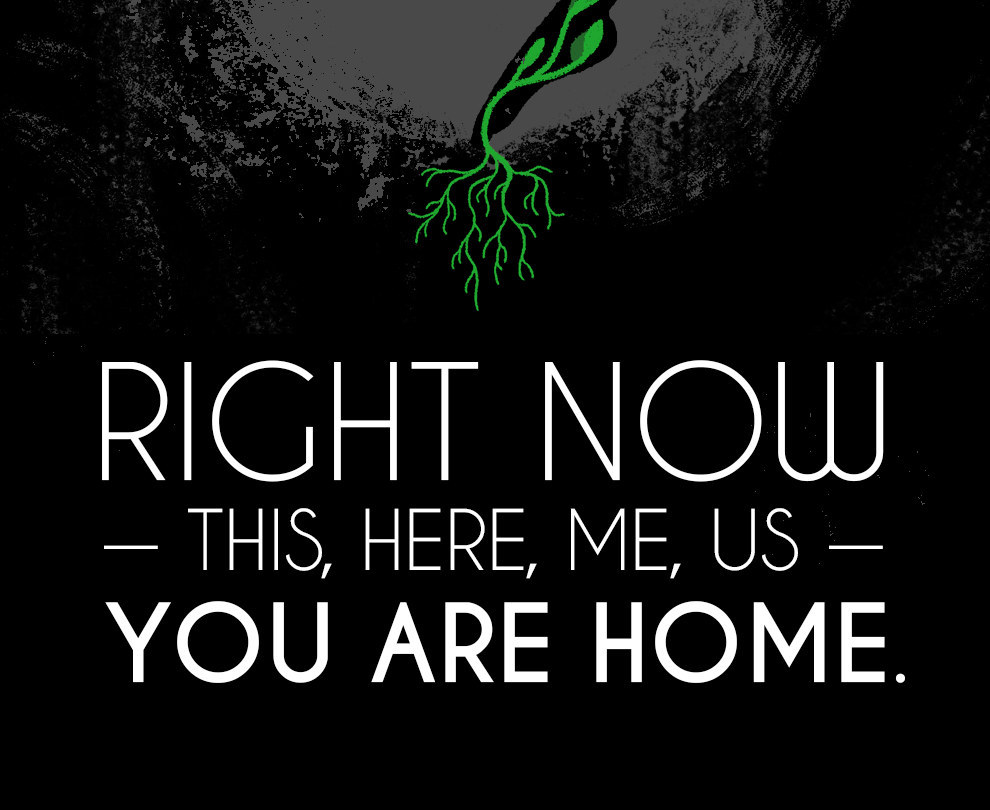
You are home, my boyfriend is fond of telling me, when my reasoning becomes a little erratic and I worry aloud that with the loss of my parents I have lost my roots on this planet. Right now — this, here, me, us — you are home. He's right, of course, and I am often reminded of it: by the poppies I planted in the garden to remind me of California, which have against likelihood reseeded; by the pinecones we have collected on our hikes, which sit in a polite row in direct view of our bed, and which are the first thing I see in the morning after I say hello to him. It is peaceful here, largely uninterrupted by the lives of others. The only music we hear is the music we choose to play. I have no choice but to listen to my own patterns of thought and breathing, in this place where I will live for years, and it was in this place I could finish what I had begun. I could write about what it meant to speculate about life on the other side of a wall, how strange it was, all those years, to pretend I could not hear, was not affected by, the sounds of fucking, of televised baseball, of drunkenness, of worn Merle Haggard cassette tapes, of bitter disputes between people who could not figure out how to love each other, of Star Trek episode after Star Trek episode, of telephone calls in which the speaker begged the person on the other end to listen a little longer, of the flint of a lighter catching again and again.
Those parts of my life are behind me now, but I can see how the external slowly becomes the internal, how we are changed by taking in all this evidence of lives that are not ours. I have yet to let go of all those sounds and faces. I have never known quiet like this before. I have never been this quiet.
***
Kathleen Alcott is the author of novels Infinite Home and The Dangers of Proximal Alphabets. Her short fiction, criticism, and essay have appeared in The New York Times, TheNewYorker.com, ZYZZYVA, The Coffin Factory, The Los Angeles Review of Books, The Believer logger, and elsewhere. Follow her at @kathleenalcott.
To learn more about Infinite Home, click here.
